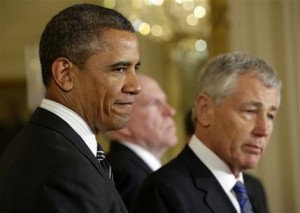 An ad from a pro-Israel group oversimplifies Chuck Hagel's foreign policy positions in an attempt to portray Obama's choice for secretary of Defense as soft on Iran.
An ad from a pro-Israel group oversimplifies Chuck Hagel's foreign policy positions in an attempt to portray Obama's choice for secretary of Defense as soft on Iran.
- The ad claims Hagel voted against sanctions on Iran. It's true that Hagel opposed unilateral U.S. sanctions, but he has voiced support for multilateral sanctions, such as those imposed by the United Nations.
- The claim that "Hagel voted against labeling Iran's revolutionary guard a terrorist group," is also accurate, but incomplete. Hagel has repeatedly called Iran a state sponsor of terror, but he opposed a Senate resolution to designate the revolutionary guard as such because he feared it was a precursor to a military attack — which he opposed.
- The ad uses an outdated quote from Hagel calling military action against Iran "not a viable, feasible, responsible option," to suggest his position is at odds with Obama's. The quote in the ad is from 2006. Since then, Hagel has said the U.S. should keep "military options" available.
On Jan. 7, Obama formally tapped Hagel to run the Pentagon. The move quickly set off a wave of opposition from some pro-Israel groups that view Hagel as soft of Iran. The group Emergency Committee for Israel created a website, chuckhagel.com, that seeks to make the case that Hagel is "not a responsible option." The group also aired a cable TV ad in the Washington, D.C., area opposing Hagel's nomination.
Hagel, a decorated Vietnam veteran and former Republican senator from Nebraska, has long pushed for diplomacy over military threats when it comes to Iran. But the ad from the Emergency Committee for Israel broad-brushes Hagel's nuanced views to present an overly simplistic and incomplete portrait of his position.
On sanctions against Iran
For example, the ad says simply that Hagel "voted against" sanctions on Iran. That's true, but that doesn't mean that he opposes all Iran sanctions.
Hagel, a senator from 1997 to 2009, has voted against unilateral U.S. sanctions against Iran, describing them as ineffective and counterproductive. But he has repeatedly voiced support for multilateral sanctions, such as U.N. sanctions. He also offered an amendment in 2001 that would have extended U.S. sanctions against Iran for two years rather than five — a position taken by the Bush administration.
By USA Today
The Iran Project is not responsible for the content of quoted articles.

